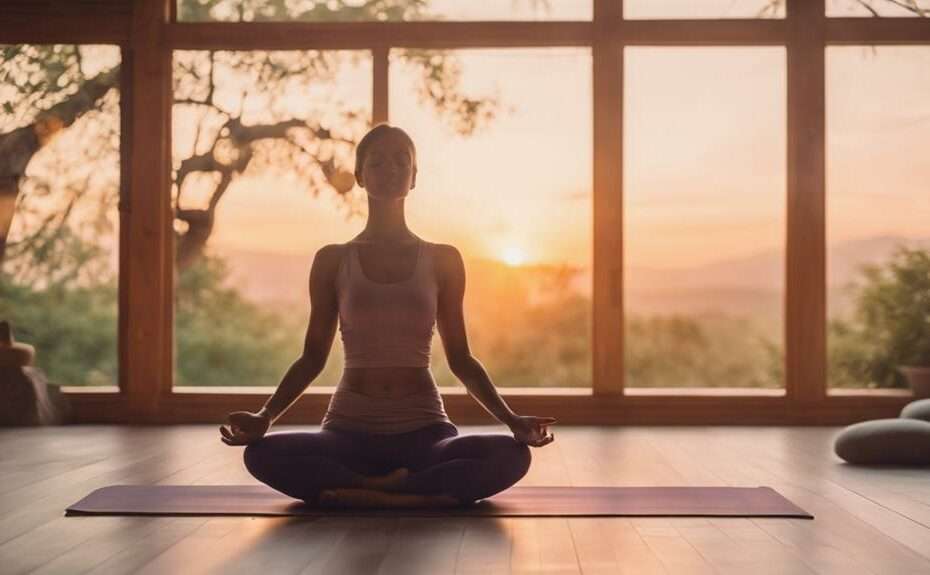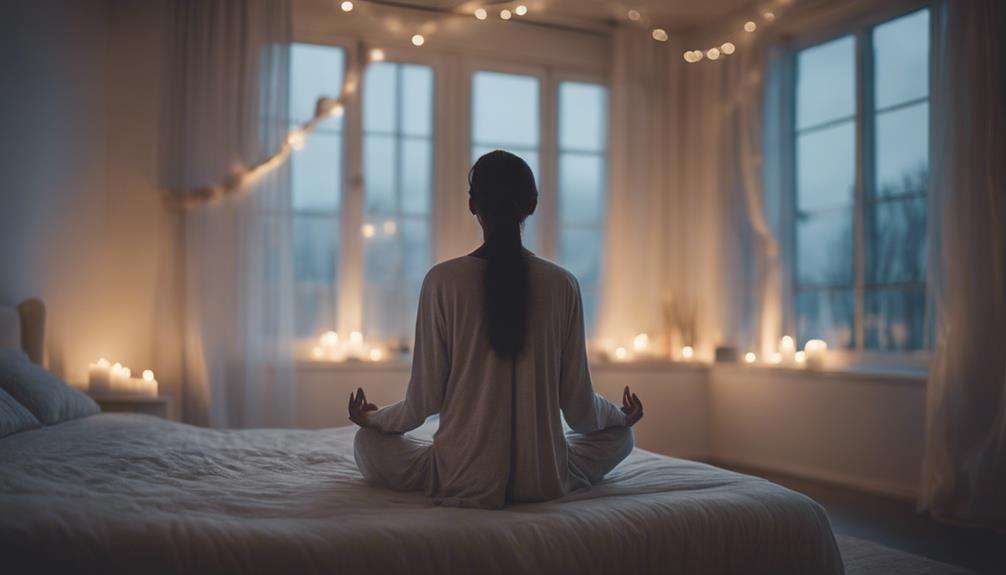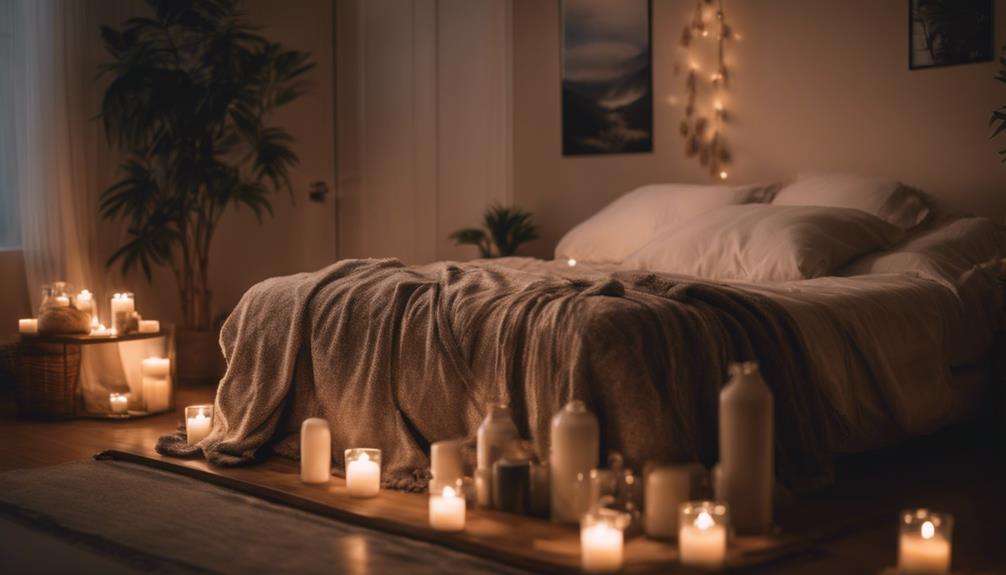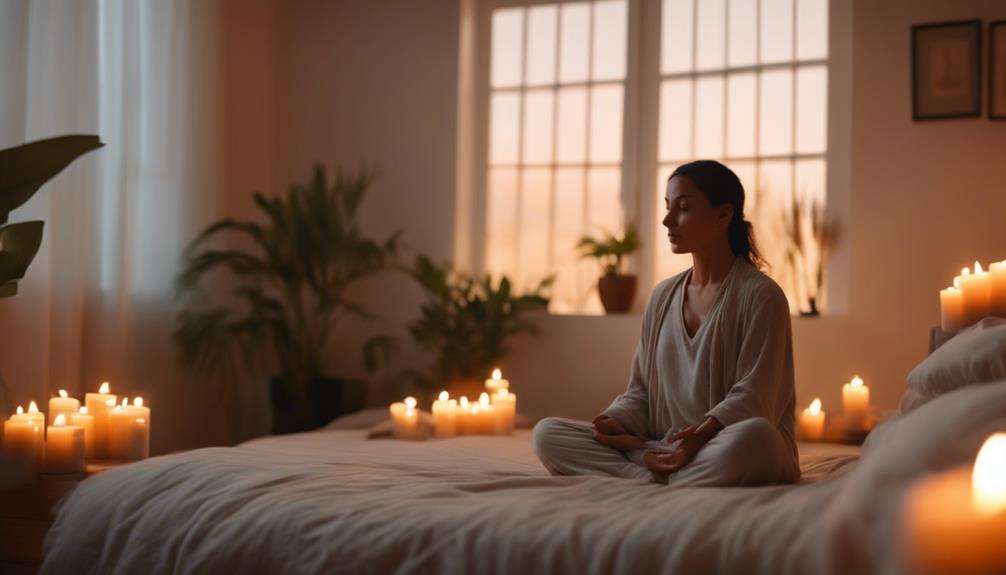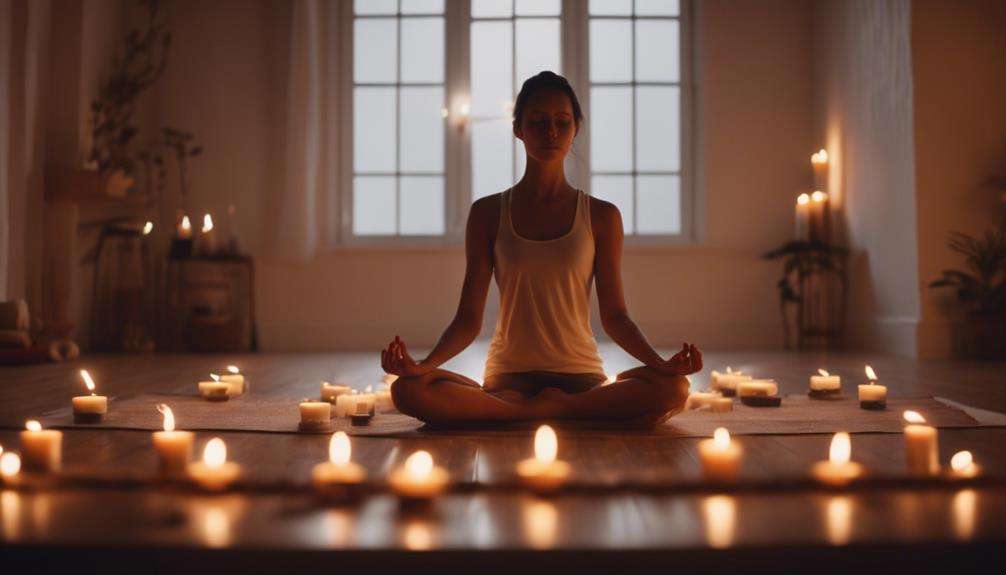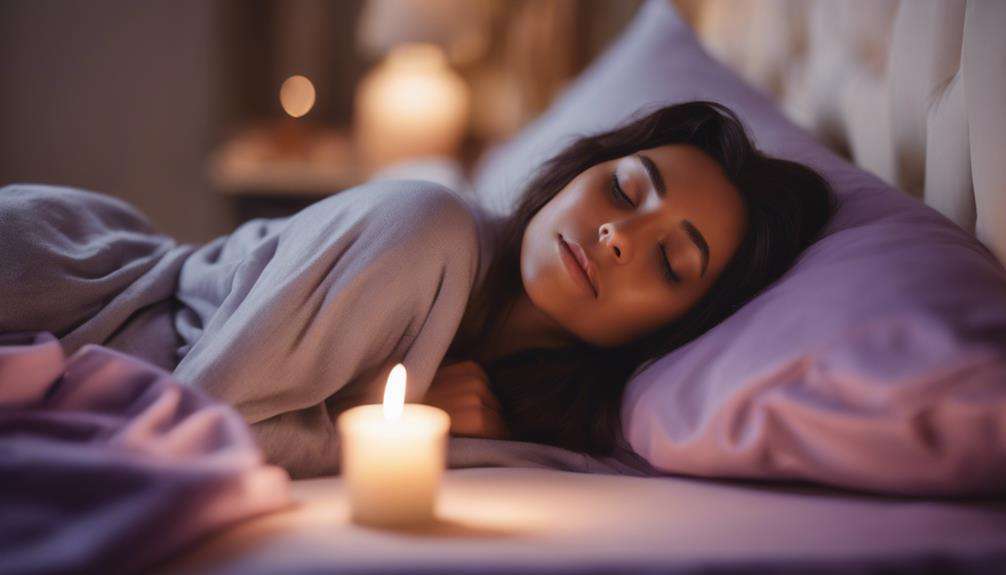Did you know that relaxation through yoga can significantly improve your sleep quality?
The connection between yoga and better sleep goes beyond just physical exercise.
By engaging in yoga practices, you can tap into a world of benefits that extend to your sleep patterns.
Stay tuned to explore how yoga's calming effects on the mind and body can pave the way for a more restful night's sleep, ultimately contributing to your overall well-being.
Key Takeaways
- Yoga induces relaxation through controlled breathing and mindfulness practices.
- Mind-body connection in yoga reduces stress and anxiety levels for improved sleep.
- Yoga regulates sleep hormones like melatonin, promoting a better sleep-wake cycle.
- Incorporating yoga techniques before bed prepares the body and mind for restful sleep.
Impact of Yoga on Relaxation and Sleep
Yoga significantly enhances relaxation and sleep quality by integrating controlled breathing, mindful movements, and tension-releasing postures that collectively promote a peaceful state of mind conducive to optimal rest.
The controlled breathing techniques in yoga play a crucial role in reducing stress hormones such as cortisol, which can interfere with your ability to relax and fall asleep. By calming the nervous system, yoga helps prepare your body and mind for a restful night's sleep. The mindfulness cultivated during yoga practice enhances your awareness of the present moment, minimizing racing thoughts and worries that might otherwise keep you awake.
Furthermore, yoga postures target physical tension stored in the body, releasing tightness in muscles and joints that can hinder relaxation. This release of physical tension not only promotes a sense of ease but also allows for deeper relaxation, setting the stage for improved sleep quality.
The holistic approach of yoga, which addresses both the physical and mental aspects of well-being, creates a harmonious environment that fosters relaxation and supports optimal sleep patterns.
The Connection Between Yoga and Sleep Quality
Enhancing your sleep quality through the practice of yoga involves a holistic approach that intertwines relaxation techniques with physical movements to create an environment conducive to optimal rest. Yoga promotes improved sleep by incorporating controlled breathing, which helps reduce stress and anxiety levels known to disrupt sleep patterns. The mind-body connection in yoga also plays a crucial role in increasing melatonin levels, the hormone responsible for regulating sleep-wake cycles. By engaging in regular yoga practice, you can enhance your overall well-being, leading to a more restful sleep experience and better sleep quality.
Yoga poses and stretches further contribute to better sleep quality by releasing physical tension in the body, preparing you for relaxation and promoting a sense of calm that's conducive to falling asleep. This holistic approach of yoga addresses both the mental and physical aspects, ultimately contributing to improved sleep quality and overall sleep hygiene. Embracing yoga as part of your routine can significantly impact your sleep patterns and overall wellness.
How Yoga Promotes Relaxation for Better Sleep
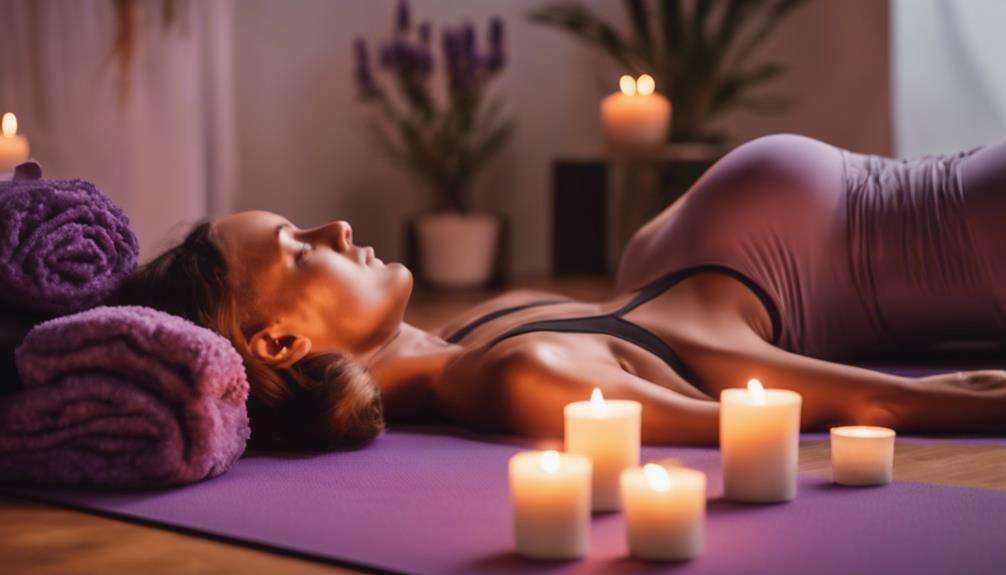
Yoga offers specific poses designed to promote relaxation, along with breathing techniques that can significantly benefit your sleep.
By incorporating mindfulness practices into your yoga routine, you can create a more holistic approach to relaxation, which can lead to better sleep quality.
Embracing the combination of physical movement, controlled breathing, and mindfulness in yoga can help calm your nervous system and reduce tension, paving the way for a restful night's sleep.
Yoga Poses for Relaxation
To promote relaxation and enhance your sleep quality, incorporating specific yoga poses into your bedtime routine can be highly beneficial. These poses focus on deep stretching, controlled breathing, and stress reduction, all of which contribute to a more peaceful state of mind before sleep.
Here are three yoga poses that can help you relax and prepare for a restful night:
- Balasana (Wide-Knee Child's Pose): This pose releases tension in your back, shoulders, and chest, promoting relaxation.
- Uttanasana (Standing Forward Bend): By stretching the hamstrings and calming the mind, this pose helps reduce cortisol levels and muscle tension.
- Supta Baddha Konasana (Reclining Bound Angle Pose): This pose activates the parasympathetic nervous system, inducing a state of calm ideal for better sleep.
Breathing Techniques Benefits
Inducing relaxation and reducing stress, controlled breathing techniques in yoga play a vital role in promoting better sleep quality. By engaging in mindful breathing practices like diaphragmatic breathing and alternate nostril breathing, you can activate the parasympathetic nervous system, signaling your body to enter a state of relaxation ideal for falling asleep easier.
These yoga breathing exercises regulate physiological functions such as heart rate and blood pressure, creating a calm and peaceful state conducive to improved sleep. The rhythmic and focused breathing techniques in yoga help release tension, lower cortisol levels, decrease muscle tension, and promote a sense of calmness essential for achieving restorative sleep.
Embrace these breathing techniques to enhance your relaxation response, reduce anxiety, and prepare your mind and body for a night of rejuvenating sleep.
Mindfulness and Sleep
Cultivating mindfulness through intentional practices can significantly contribute to reducing stress and anxiety, fostering an environment conducive to better sleep quality. When you engage in mindfulness through yoga, you're boosting melatonin levels, which regulate your sleep-wake cycle.
Deep breathing techniques employed in yoga help trigger the relaxation response, calming your nervous system and preparing your body for restful sleep. By enhancing your mental focus during yoga practice, you aid in stress reduction, paving the way for improved overall well-being.
Embrace the power of mindfulness in yoga to not only alleviate anxiety but also to optimize your sleep cycles, promoting a state of tranquility for a peaceful night's rest.
Yoga Poses for Improved Sleep
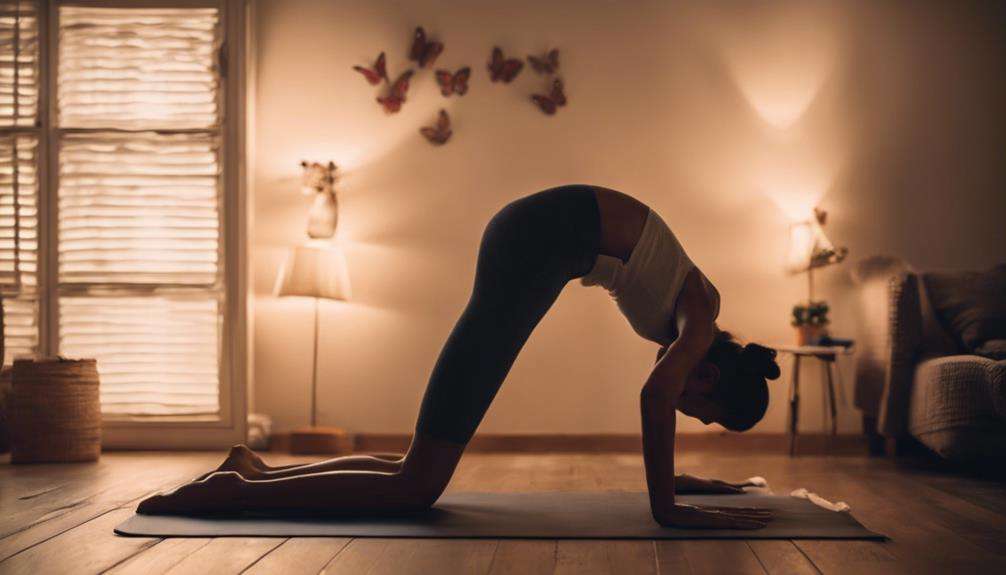
For a more restful night's sleep, consider incorporating these yoga poses known to promote relaxation and release tension.
Uttanasana (Standing Forward Bend) and Viparita Karani (Legs-Up-the-Wall Pose) are excellent choices to enhance better sleep quality by helping the body relax.
Supta Baddha Konasana (Reclining Bound Angle Pose) and Balasana (Child's Pose) can specifically target areas of tension in the hips and groin, paving the way for a more peaceful sleep experience.
Savasana (Corpse Pose) and Ardha Uttanasana (Standing Half Forward Bend at the wall) are effective in calming the mind and preparing the body for a good night's rest.
These yoga poses not only encourage deep breathing and mindfulness but also aid in stress reduction, all of which are crucial for achieving improved sleep patterns.
Regular practice of these poses tailored to your needs can significantly enhance your sleep quality by promoting relaxation and tranquility before bedtime.
Understanding Yoga's Influence on Sleep
Yoga's impact on sleep quality is significant, as it promotes relaxation through controlled breathing techniques and mindfulness practices that aid in reducing stress and anxiety levels. This influence can be better understood by considering the following:
- Melatonin Boost: Mindfulness practices in yoga help increase melatonin levels, the hormone responsible for regulating sleep-wake cycles. This hormonal balance fosters a conducive environment for better sleep quality.
- Physical Tension Release: Yoga poses and stretches are effective in releasing tension accumulated in the body throughout the day. By easing physical discomfort, these movements prepare the body for a more restful sleep experience.
- Nervous System Regulation: The combination of physical movement, controlled breathing, and meditation in yoga assists in calming the autonomic nervous system. This calming effect reduces arousal levels, creating an internal environment ideal for achieving restorative sleep.
Understanding how yoga influences sleep through relaxation, mindfulness practices, and physical movements can help you harness its benefits to improve your sleep quality and overall well-being.
Benefits of Yoga for Restful Sleep
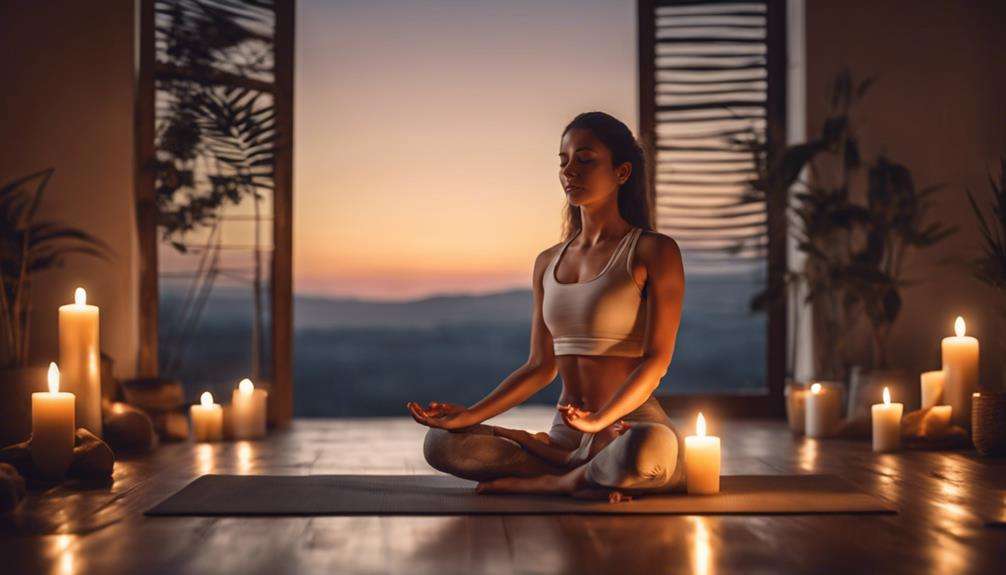
To achieve restful sleep, incorporating yoga into your daily routine can offer a multitude of benefits for enhancing sleep quality and overall well-being. Yoga promotes relaxation through mindfulness, deep breathing, and meditation techniques, which are essential for improving sleep.
By engaging in deep breathing exercises during yoga, you can induce a sense of calmness that relaxes the nervous system, paving the way for better sleep patterns. The practice of yoga fosters a strong mind-body connection, aiding in the reduction of stress and anxiety levels that often disrupt sleep.
Additionally, this mind-body link helps lower cortisol levels and promotes the production of melatonin, a hormone critical for achieving restful sleep. With over 55% of yoga practitioners reporting improvements in their sleep quality, it's clear that the combination of physical movement, deep breathing, and mindfulness in yoga can significantly enhance your overall sleep experience.
Start incorporating yoga into your routine to reap these sleep-enhancing benefits today.
Yoga Techniques for Enhanced Sleep Quality
Enhancing the quality of your sleep through targeted yoga techniques involves incorporating mindful practices like controlled breathing and deep relaxation. When you engage in these practices, you're actively working towards improving your sleep quality by addressing factors like stress, anxiety, and melatonin levels. Here are three key yoga techniques that can greatly enhance your sleep quality:
- Controlled Breathing: By focusing on your breath and practicing deep breathing exercises, you can calm your mind and prepare your body for a restful night's sleep. Controlled breathing techniques in yoga help alleviate stress and anxiety, allowing you to relax more deeply.
- Mindfulness: Incorporating mindfulness into your yoga practice promotes relaxation and reduces the racing thoughts that often hinder falling asleep. Being present in the moment through mindfulness techniques can create a sense of peace and tranquility conducive to better sleep.
- Restorative and Hatha Yoga: These specific types of yoga focus on gentle movements, deep relaxation, and stress reduction. By practicing restorative or Hatha yoga before bed, you can release tension in the body and mind, paving the way for a more rejuvenating sleep experience.
The Science Behind Yoga and Better Sleep
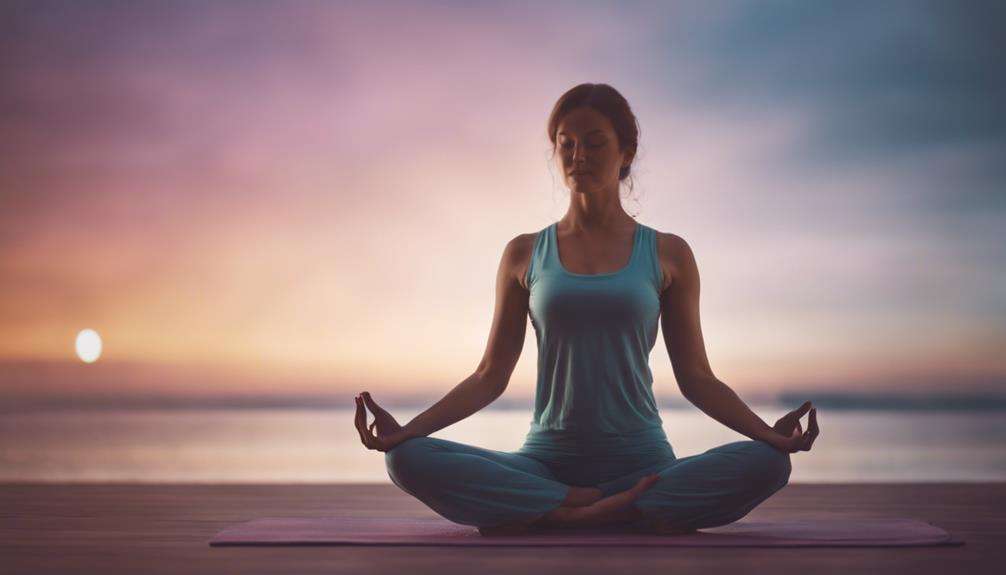
Better sleep is achieved through the science-backed benefits of incorporating yoga practices that reduce stress, enhance relaxation, and regulate key sleep hormones. The physical aspect of yoga practice not only improves overall health but also plays a crucial role in enhancing sleep quality.
By engaging in relaxation techniques like deep breathing and mindfulness during yoga sessions, you can effectively alleviate anxiety and calm your mind, paving the way for a restful night's sleep. These practices help increase melatonin levels, which are essential for regulating the sleep-wake cycle.
The combination of breath control, movement, and mental focus in yoga stimulates the parasympathetic nervous system, promoting a state of relaxation that's conducive to falling asleep faster and experiencing deeper sleep throughout the night. By incorporating yoga into your routine, you can reap the benefits of improved sleep quality and overall well-being.
Frequently Asked Questions
Why Is Yoga Good for Relaxation?
Yoga is good for relaxation because it offers stress relief, enhances mind-body connection, promotes muscle relaxation, reduces anxiety, teaches breathing techniques, improves flexibility, fosters mindfulness, calms the mind, enhances sleep quality, and supports emotional balance.
How Can Yoga Help Insomnia?
Yoga helps insomnia by relieving stress, connecting mind and body, deep breathing, relaxing muscles, establishing a bedtime routine, improving sleep quality, enhancing mental clarity, calming the mind, promoting sleep hygiene, and providing relief for insomnia.
What Does Yoga Think About Sleep?
When it comes to sleep, yoga recognizes it as vital for your well-being. Through meditation benefits, breathing techniques, and stress reduction, yoga fosters a strong mind-body connection and promotes better sleep quality.
Has Yoga Been Found to Be Beneficial for Sleep Difficulties?
Yoga has been found to help with sleep difficulties by reducing stress, improving the mind-body connection, encouraging deep breathing, promoting muscle relaxation, calming the mind, enhancing focus, establishing a bedtime routine, regulating sleep hormones, and incorporating restorative poses for better sleep quality.
Conclusion
So next time you're struggling to catch some Z's, remember that yoga isn't just a physical exercise, but a powerful tool to improve your sleep quality.
By incorporating yoga into your routine, you can calm your mind, reduce stress, and prepare your body for restful sleep.
Let the soothing practice of yoga guide you towards a peaceful night's rest, allowing you to wake up refreshed and rejuvenated.
Sweet dreams await on your mat.
